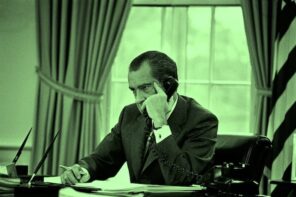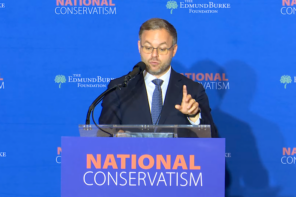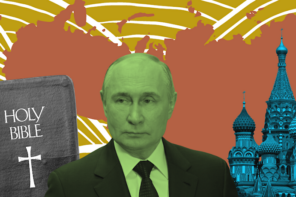Russia: Anti-Gay persecution in Chechnya generates international protest
International attention and protest continued to be focused on reports of anti-gay detentions, torture and violence in Muslim-majority region of Chechnya. From the New York Times:
Homosexuality is taboo in Chechnya and the mostly Muslim surrounding areas of the Caucasus region in southern Russia. “This society is highly homophobic,” said Ekaterina L. Sokiryanskaya, Russia project director for the International Crisis Group and an authority on Chechnya. “Homosexuality is condemned. It is believed Islam considers it a great sin.”
Nevertheless, before the crackdown, gay men in Chechnya could at least lead social lives, if heavily closeted ones, Maksim said. They met largely in private chat rooms on social networking sites with names like the Village or What the Mountains Are Silent About.
… The crackdown began after GayRussia, a rights group based in Moscow, applied for permits for gay pride parades in the Caucasus region, prompting counterprotests by religious groups, the men said. In Chechnya, it became something even worse — a mass “prophylactic” cleansing of homosexuals, the security service agents told the gay men as they rounded them up.
At a protest in Santiago, Chile, people wore pink triangles, drawing parallels between the reported concentration camps in Chechnya and those in Nazi Germany. Human rights activists began collecting and publicizing accounts of survivors and called on Federica Mogherini, the European Union’s “top diplomat,” to raise human rights during an upcoming meeting with Russian foreign minister Sergey Lavrov. OutRight Action International urged activists to pressure multinational oil companies to use their leverage. Some European governments have been raising funds to evacuate gay men and expediting visa processing.
U.S. Ambassador to the United Nations Nikki Haley released a statement saying the U.S. government is “disturbed” by the reports and calling on Chechen authorities to investigate: “We are against all forms of discrimination, including against people based on sexual orientation. When left unchecked, discrimination and human rights abuses can lead to destabilization and conflict.”
![]() Enter to win a $50 Amazon gift card!
Enter to win a $50 Amazon gift card!
Click HERE to take our 2-minute reader survey.
Chechen leader Ramzan Kadyrov, an ally of Russian President Vladimir Putin, reportedly told Putin at a meeting last week that the reports are untrue.
Elena Milashina, the reporter who exposed the allegations reported that the story has generated the biggest reaction they ever seen in years of covering Chechnya, and told the Washington Post that she will leave the country for a while. Reporters working for the paper have been repeatedly and explicitly threatened by Chechen religious and political leaders. “We are experienced with people murdering our colleagues, so we know a little more now about how killers operate. We will pay attention to those things. Sad to say, but we will.
France: Will Islamic State violence drive gay voters to Le Pen?
Xavier Jugelé, an openly gay police officer was killed by a gunman reportedly connected to the Islamic State. Jugelé had been deployed during the 2015 attack on the Bataclan nightclub and attended last year’s reopening concert by Sting.
In the first round of voting in French national elections, the top two vote-getters were Emmanuel Macron and Marine LePen, who will face each other in a May 7 runoff. Macron is a supporter of the European Union, while the National Front’s LePen is a Putin-admiring nationalist who would like France to leave the EU. In their concessions, both conservative François Fillon and Socialist candidate Benoît Hamon urged their supporters to vote for Macron.
Journalist Karen Ocamb asks, “Is Le Pen Faking it for Gay France,” noting that the far-right candidate is, according to some polls, drawing more support from LGBT people than the public at large.
“Faced with the current threats, particularly from radical Islam, gays have realized they’ll be the first victims of these barbarians, and only Marine is proposing radical solutions,” Le Pen supporter Kelvin Hopper, 25, told the Associated Press for an April 7 report. …
Both Macron and Le Pen catered to anti-gay Catholics after the resurfacing of the anti-gay marriage French coalition La Manif Pour Tous (Demonstration For All) in October 2016, with 24,000 demonstrators demanding that candidates pledge to repeal the marriage law. Le Pen made the pledge, later promising civil unions. Macron bowed, too, telling l’Obs that people who opposed marriage equality had been “humiliated” by a government that had ignored “a part of the country which has good reasons to live in resentment and sad passions.”
Candidate pledges and victimhood appeals are tactics promoted by the U.S.-based anti-LGBT, Catholic-minded National Organization for Marriage, which wants to play its hand in the French elections, too. Socialist President Francois Hollande signed marriage legislation on May 18, 2013 amid violent clashes and thousands of protesters decrying the scuttling of traditional family values as the fall of Western civilization. In the wings was NOM President Brian Brown, who advised, trained and supported La Manif Pour Tous. And though the protests subsided, the relationship between La Manif Pour Tous leader Ludovine de la Rochere and Brown blossomed, with de la Rochere flying to Washington DC to speak at NOM’s June 19, 2014 Marriage March. The two apparently wanted to collude again, this time to influence the French elections in presidential elections in May and the legislative elections in June, arguing for traditional family values.
South Korea: Army reportedly targeting gay soldiers
Army investigators, reportedly under orders from the Army chief of staff who also heads a Christian military organization, have been using gay dating apps to identify gay soldiers, according to a story in Quartz by Jeyup S. Kwaak and Isabella Steger:
Army investigators have been trying to dox suspected homosexual soldiers through the use of dating apps, with at least one soldier arrested so far for allegedly engaging in homosexual acts, according to the Military Human Rights Center of Korea (MHRCK), an activist group. The allegations draw attention to Korea’s conservative attitudes towards homosexuality, particularly in the military, which is one of the country’s most powerful institutions. It’s a crime for Korean soldiers to engage in consensual homosexual acts, but that’s not true of same-sex relations; outside the army, same-sex relations are legal but not widely accepted.
The legal ban on same-sex relations in the military was upheld by judges last year in order to preserve “fighting strength.”
Even as attitudes towards homosexuality in other traditionally conservative Asian countries begin to loosen up, including in Japan, acceptance of LGBT people in Korea remains relatively poor. Young people are growing increasingly accepting of LGBT people, but still less than 24% of Koreans said they had “no reservations about homosexuality,” according to a 2014 survey conducted by the Asian Institute for Policy Studies, a think tank.
Korea has a large Christian population, and vocal Protestant groups have for years blocked the inclusion of sexual minorities in a proposed anti-discrimination bill by pressuring politicians to vote against it. Jang, the army chief of staff who allegedly ordered the investigation into gay soldiers, is also the head of the Korea Military Christians Federation (link in Korean).
Taiwan: ‘Bitter backlash’ from conservative Christians slows momentum toward marriage equality
Taiwan’s move toward becoming the first Asian country to embrace marriage equality has sparked a “bitter backlash” that leaves the future of marriage in doubt, reports Emily Rauhala at the Washington Post:
For years now, these islands have been at the forefront of Asia’s gay rights movement. While Singapore criminalizes gay sex and China cracks down on LGBT organizing, Taiwan has moved toward inclusion: Gays and lesbians serve openly in the military, textbooks extol equality, and Taipei’s annual gay-pride parade draws tens of thousands from across the region and around the world.
Taiwanese often credit this openness to Taiwan’s range of cultural influences, from indigenous groups to Dutch and Japanese colonizers, to seafaring settlers from the Chinese mainland — and their seafaring gods.
But the groundswell of support that spurred hope for marriage equality has spurred a bitter backlash that has experts and advocates wondering when or whether the law will move ahead.
Over the past year, mostly Christian community groups have mobilized against the marriage-equality movement, warning, contrary to evidence, that same-sex partnerships are a threat to children and that giving LGBT families legal protection will hurt Taiwan. …
Though only 5 percent of Taiwanese identify as Christians, well-funded and well-organized church groups have commandeered the conversation, primarily by playing on parental fear.
In recent months, concerned groups have reprised homophobic tropes about homosexuality, casting same-sex marriage as a gateway to incest, bestiality and AIDS. One group warned that new marriage laws could lead to a future where “it’s possible to marry a Ferris wheel.”
Scotland: Church of Scotland will consider apology to LGBT people, examination of marriage
Next month, the Church of Scotland’s General Assembly will consider a call to apologize to the LGBT community. The call is based on a report from the church’s Theological Forum. From the BBC:
The report reflected a range of theological thinking on the issue of same-sex relationships.
It acknowledged the traditionalist view that Biblical writers condemned same-sex acts, making the only appropriate response for the Church was to proclaim they are contrary to God’s intentions for humanity – meaning gay marriages should be prohibited.
But it also examined the revisionist arguments.
It said: “Scriptural condemnations of same-sex sexual activity were framed in cultural contexts very different from our own and referred to individual acts rather than committed and faithful people willing to enshrine their relationships in vows before God.”
More from the Scottish Sun:
It comes after years of internal turmoil and dispute over the kirk’s policy towards homosexuals.
Rev Rennie, minister at Queen’s Cross Church, Aberdeen, praised the watershed move – the details of which are contained in a new report by the Theological Forum on the theology of same-sex marriage.
He said: “It seems to me that the Forum is asking the church at large to recognise the faith of gay people in its midst, and to cherish their part in the life of the church.
“The request that the Kirk recognise its failure through the years to value, encourage, and support gay people in its pews, and to do better in the future – is one of the most positive and hopeful things I have read in a report to the General Assembly in many years.”
The Legal Questions Committee may also be tasked with reviewing whether ministers should be allowed to conduct marriage ceremonies for same-sex couples.
Panama: More debate on marriage
Public debate over the possibility of legalizing marriage for same-sex couples continues:
“Homosexuals pay taxes, work, produce. They are citizens, and therefore the Constitution guarantees their security and their rights, “said sociologist Celia Moreno.
However, there are those who believe that a comprehensive revision of the Constitution should be necessary to reform the concept of marriage.
“It is necessary to debate a constitutional reform to see the possibility. In my opinion, the marriage that should be valid is the one that inspired Christian morality and has been validated by the Constitution, “said lawyer Ernesto Cedeño.
Northern Ireland: Party leader declares ‘Peter will not marry Paul’
The right-wing Democratic Unionist Party, which has consistently blocked marriage equality legislation from moving forward, has insisted that a continued ban on same-sex couples marrying is a condition of its participation in a governing coalition. The second-largest party, Sinn Fein, has been insisting on marriage equality, but the DUP’s Jim Wells insisted, “Peter will not marry Paul in Northern Ireland.”
Nigeria: Mass arrest of men celebrating gay ‘wedding’
Police arrested 53 young men who celebrated a gay wedding, reports Associated Press, “and charged them with ‘belong to a gang of unlawful society.’”
Philippines: President declares marriage between a man and a woman
Strongman President Rodrigo Duterte spoke in Bahrain earlier this month, where he again insisted that marriage is between a man and a woman.
Czech Republic: Marriage equality campaign launched by NGOs
Five NGOs have launched a campaign to promote marriage equality, where same-sex couples have been able to register as partners since 2006.
Mexico: Gay soccer team hurt by US visa denials
The Set Pieces, a sports site, features the Zorros Club de Futbol, an amateur soccer team from Mexico City whose players are gay; a number of team players have been denied visas to participate in the World Out Games in Miami in May.
United Kingdom: Mapping identifies concentrations of LGBT people beyond London
While the U.S. Census Bureau will not document the LGBT population in the 2020 census, the UK’s Office for National Statistics has mapped the country’s GLB population for the first time. The survey has found that in addition to a concentration in London, some rural counties have significant concentrations of gay, lesbian and bisexual people:
By a slender margin, Northern Ireland was the country of the UK found to have the highest proportion of gay men – an estimated 1.6%, compared with 1.5% for England, 1.3% for Wales and 1.1% for Scotland. But it was also the country where women were least likely to say they were lesbian – just 0.3%.
However, some questioned the impact of how the data was collected. “I’m encouraged to see there’s been an increase in people in Northern Ireland identifying as LGB, but this disparity I find really challenging,” said Gavin Boyd, policy manager at the Rainbow Project, a Belfast-based support organisation.
One factor could be a reluctance by women to identify themselves as lesbian, he said. “You’ll find in a lot of places that have experienced armed conflict, the role of women tends to be minimised: post-conflict places tend to be quite macho societies.”
It is possible, he said, that women do not feel able to say they are lesbian in a place where declaring as such “could still be considered a political act”. “Lots of out people would have difficulty identifying themselves as gay to someone from the government who’s knocking on the door … it’s always going to be a particular challenge for some people to answer that question honestly.”
China: Homophobic banner sparks debate
Two students at Huazhong University of Science and Technology in Wuhan sparked debate after unfurling a banner that read, “Protect Chinese traditional mores, defend core socialist values, resist corrosion from decadent Western thoughts, and keep homosexuality far from the university campus.” The basketball coach posted a photo of the banner with supportive comments. More from Gay Star News:
One of the girls posted on her Qzone account that ‘the women’s basketball team used to be disaster area for homosexuality’.
‘But after our positive education and reform, there are very few gay people left on the women’s basketball team,’ she wrote.





